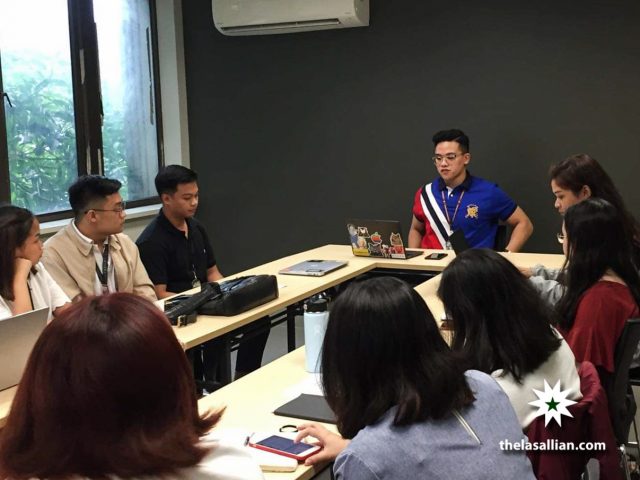The Legislative Assembly (LA) held its first session for the academic year (AY) last September 12 at the University Student Government (USG) Session Hall at the third floor of Br. Connon Hall. The assembly convened to nominate a Chief Legislator, to elect the majority and minority floor leaders, and to discuss a resolution that would allow emergency magistrates to take power in the USG Judiciary.
Platforms for the position of Chief Legislator
The session began with the nomination of FAST2017 representative Neal Gonzales and BLAZE2019 representative Willem De Castro for the position of Chief Legislator, led by the USG Executive Treasurer Kevin Wu.
De Castro bared his platform that emphasized alignment, transparency, and efficiency. Encouraging the LA representatives, he stated that they should “be brave and bold decision-makers that fight for the welfare of the students that [they] represent.” Among his plans of action were easier transmission of resolutions to the Office of the President (OPRES), better transparency through the LA Public Information Office (PIO), consistent monitoring of proposed legislations, invitation of speakers who will further train the representatives, and prioritization of resolutions that are the most feasible and practical.
On the other hand, Gonzales stated the LA’s desire to have transparency and identity. Aiming to decrease the number of students who are unaware of the LA’s duties and the purpose of resolutions, he described his plan to coordinate with the Office of the Executive Secretary (OSEC) and media organizations to better inform the student body of the happenings within assembly sessions. Gonzales also proposed improved collaboration between representatives and their stakeholders, strengthened manifestos to unify different student sectors for joint statements, and full utilization of the PIO.
“I am a Chief that listens,” Gonzales said.
The canvassing of votes from the LA transpired after the nominees articulated their platforms. De Castro garnered 10 votes while Gonzales attained six. Wu thereafter called on De Castro to orchestrate the succeeding agenda as the newly elected Chief Legislator for AY 2019-2020.
Moving on to the next agenda, the representatives proceeded to the election of majority and minority floor leaders, electing FAST2018 representative Maegan Ragudo and Gonzales, respectively.

On granting emergency magistrate training
De Castro, now the assembly’s chief, called on the proponents of the resolution granting emergency magistrates power in the USG Judiciary.
The authors of the resolution, namely Gonzales, EDGE2018 representative Leonna Gula, EXCEL2020 representative Katrina Ignacio, Ragudo, and BLAZE2020 representative Urban Teh, presented this before the LA.
The proponents disclosed that the USG Judiciary failed to perform efficiently beginning the second term of AY 2018-2019 due to the lack of active members and eligible magistrate applicants. Hence, the said resolution was proposed to allow “the USG Judiciary to conduct the application process for magistrates with supplementary guidelines.” The proponents then tackled the Judiciary Emergency Guidelines to support the resolution.
Brief overview of the resolution
Specific sections of the resolution were highlighted such as the Magistrate Training Program (MTP), Duties and Responsibilities, and Special Provisions, among others.
According to the proponents, close collaboration with the Office of Student Leadership, Involvement, Formation, and Empowerment is essential for the MTP. Moreover, the appointed Judiciary Officer in Charge and the magistrate applicants are expected to still undertake the respective exams, interviews, and other necessary screening procedures. This is to ensure that they uphold the distinguished standards indicated in the USG Constitution. “We just do not want magistrates for the sake of having them there. We want them to be able to perform their duties,” Teh stressed.
The resolution also established the need for at least three magistrate applicants so that the Judiciary will be able to properly function without discrepancies. Additionally, the submission of term end reports to OPRES is required for maintaining consistency and accountability in procedural processes.
The proponents then affirmed that the emergency powers shall be taken into effect if there is a “lack of successors to the seats of the Magistrates.” In other words, no applicants were able to undergo the MTP in the previous year. The resolution will also serve as a basis for the future representatives in case a similar incident arises, guaranteeing a secure qualification process for magistrate applicants. The resolution was passed as all present representatives voted in favor.
